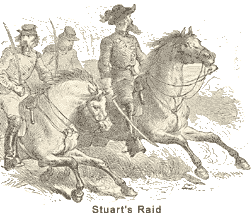James Ewell Brown Stuart was born in Patrick County, Virginia, and graduated from the U.S. Military Academy in 1854. He served with the 1st Cavalry until the outbreak of the Civil War, when he resigned to become a captain with the Confederate cavalry.
 His involvement in the conflict was immediate and distinguished. He served at First Bull Run in July 1861 and was promoted to brigadier general in September. In the spring of 1862, Stuart executed the first of his famed cavalry raids, completely circling McClellan’s forces and gaining valuable information on troop deployment. Robert E. Lee’s defense of Richmond in the Seven Days’ Battles was greatly enhanced by Stuart’s report. In July he was promoted to major general.
In August 1862 Stuart conducted his second major foray, this time at the expense of John Pope. A raid of the Union headquarters yielded a list of troop positions, which was helpful to the Confederate forces in their victory at Second Bull Run.
A third raid was made in the fall of 1862, when Stuart and his soldiers ventured as far north as southern Pennsylvania, a maneuver highlighted by the capture of more than 1,000 Union horses.
Stuart’s forces saw further action at Fredericksburg (December 1862) and Chancellorsville (May 1863); at the latter Stuart was given command following the wounding of "Stonewall" Jackson.
The greatest cavalry encounter of Stuart’s career occurred at the Battle of Brandy Station in Culpeper County, Virginia, June 1863. This was the first battle of the Gettysburg campaign and involved more than 17,000 mounted soldiers. Stuart played a major role in halting the Union forces' advance, but the dominance of the Southern mounted soldiers was ended.
At Gettysburg, Stuart, in violation of Lee’s orders, conducted an extended raid prior to the battle's commencement. By the time he and his exhausted soldiers rejoined Lee, the battle was underway. Lee was denied badly needed information about Union troop deployment and Stuart’s soldiers were too tired to be an effective fighting force.
Stuart was killed in action in the Confederate defeat at Yellow Tavern in May 1864.
Jeb Stuart was probably the most skilled intelligence officer of his era. Lee referred to him as “the eyes of the army.” Stuart, despite his short life, became a great popular hero, widely admired in the South for his swagger and daring. Some, however, have placed the blame on Stuart for the Confederate loss at Gettysburg.
His involvement in the conflict was immediate and distinguished. He served at First Bull Run in July 1861 and was promoted to brigadier general in September. In the spring of 1862, Stuart executed the first of his famed cavalry raids, completely circling McClellan’s forces and gaining valuable information on troop deployment. Robert E. Lee’s defense of Richmond in the Seven Days’ Battles was greatly enhanced by Stuart’s report. In July he was promoted to major general.
In August 1862 Stuart conducted his second major foray, this time at the expense of John Pope. A raid of the Union headquarters yielded a list of troop positions, which was helpful to the Confederate forces in their victory at Second Bull Run.
A third raid was made in the fall of 1862, when Stuart and his soldiers ventured as far north as southern Pennsylvania, a maneuver highlighted by the capture of more than 1,000 Union horses.
Stuart’s forces saw further action at Fredericksburg (December 1862) and Chancellorsville (May 1863); at the latter Stuart was given command following the wounding of "Stonewall" Jackson.
The greatest cavalry encounter of Stuart’s career occurred at the Battle of Brandy Station in Culpeper County, Virginia, June 1863. This was the first battle of the Gettysburg campaign and involved more than 17,000 mounted soldiers. Stuart played a major role in halting the Union forces' advance, but the dominance of the Southern mounted soldiers was ended.
At Gettysburg, Stuart, in violation of Lee’s orders, conducted an extended raid prior to the battle's commencement. By the time he and his exhausted soldiers rejoined Lee, the battle was underway. Lee was denied badly needed information about Union troop deployment and Stuart’s soldiers were too tired to be an effective fighting force.
Stuart was killed in action in the Confederate defeat at Yellow Tavern in May 1864.
Jeb Stuart was probably the most skilled intelligence officer of his era. Lee referred to him as “the eyes of the army.” Stuart, despite his short life, became a great popular hero, widely admired in the South for his swagger and daring. Some, however, have placed the blame on Stuart for the Confederate loss at Gettysburg.